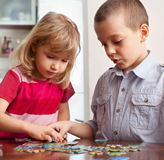WPDN screens each student for developmental delays six times per year, enabling us to identify any issues and immediately begin remediation. Results of screenings like Ages and Stages, Brigance and Child Observation Record are always shared with parents, and help us measure progress against important milestones. Our Behavior and Family Specialist helps families gain access to support resources when necessary, including our visiting speech and language therapist.
Weekly cooking projects, such as making biscuits or “ants on a log” (celery, peanut butter and raisins), help children learn about healthy eating and increase their desire to care for themselves. These projects also use real life math skills such as measuring and counting, fine motor skills like spreading and mixing, and the early literacy skill of reading picture recipe cards.
Winter Park Day Nursery has a library of more than 5,000 books. Children are encouraged to take home a book each week for their parents to read to them. We are also lucky to have children’s storyteller from Winter Park Public Library at the school each week to entertain the children and further develop their literary interests.
Childhood obesity has tripled in just 20 years. Preschool children who are inactive risk becoming overweight later in life. The U.S. Surgeon General says daily exercise is a key to being fit. For these reasons, WPDN students spend time every day on outside physical activities and participate in an organized physical education class once a week.
Art is one of the early ways children share their ideas and feelings with others. Through the exploration of art materials, our students develop their fine motor skills and construct their knowledge of representation. Winter Park Day Nursery teaches process-oriented art, which does not prescribe ‘projects’, but presents opportunities to explore a medium with no expectation of a product. This environment fosters creative learning experiences that help children and adults recognize and celebrate individual uniqueness.
Young children are naturally curious and eager to learn. Winter Park Day Nursery’s science program supports and encourages this desire through scientific inquiry. Children are given opportunities to explore, predict, experiment and share their findings in a safe environment. Teachers provide materials that spark children’s imagination and curiosity, then ask questions that encourage students to think and explore.
Winter Park Day Nursery’s students experience both indoor and outdoor activities to enhance their gross and fine motor skills. Simple tasks that develop hand-eye coordination, whole body movement, balance and control are set up daily on the playground and in classroom centers. Children have opportunities to practice skills and challenge themselves under the watchful eye of a caring teacher.
Young children develop competency in their abilities along with an understanding of emotions and empathy towards others. Winter Park Day Nursery follows the Conscious Discipline character-development program developed by Dr. Becky Bailey. Classroom rules are based on safety, a feeling of belonging and being recognized as a valuable member of the group. Children learn that they are important as they help keep the classroom safe and running smoothly by doing simple jobs and reminding each other of the rules. Teachers help children develop conflict resolution skills and work toward win-win solutions.
Mathematical thinking includes not only number concepts, but also understanding patterns, relationships and mathematical processes. Our teachers use manipulatives and real-life mathematical problems throughout the day to help children develop an understanding of concepts such as time and measurements.
Literacy is not an either-or phenomenon. It is a gradually emerging competency. The International Reading Association lists five phases of literacy development beginning at birth. Our programs help children develop through the phases of Awareness, Exploration, Experimental Reading and Writing to gain the understanding of print that is necessary before learning to read.




